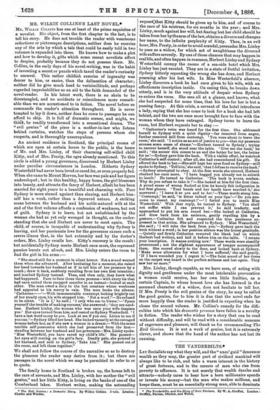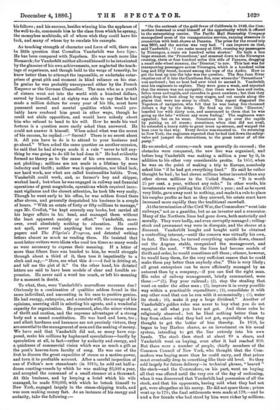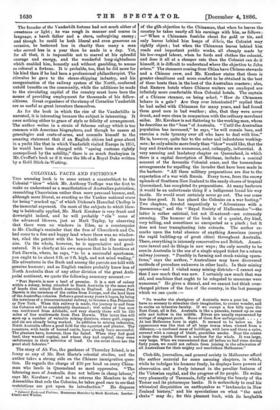THE VANDERBILTS.*
LET Socialists say what they will, and the" unco' guid "denounce wealth as they may, the greater part of civilised mankind will always like to be rich, and take a warm interest in the history of great fortunes, and in the careers of men who rise from poverty to affluence. It is not merely that wealth dazzles and attracts—nobody cares to hear how a born millionaire spends or invests his money—bat the man who makes millions, and keeps them, must be an essentially strong man, able to dominate • The Vanderbilte, and the Story of their Fortune. By W. A. Croffut. London : Griffith, Ferran, Okeden, and Welsh. -his fellows ; and his success, besides winning him the applause of the well-to-do, commends him to the class from which he sprang, the moneyless multitude, all of whom wish they could have his lack, and many of whom try to emulate his example.
As touching strength of character and force of will, there can be little question that Cornelius Vanderbilt was hors ligne. He has been compared with Napoleon. He was much more like Bismarck; for Vanderbilt neither allowed himself to be intoxicated by the glamour of his own achievements, nor neglected the teach- ings of experience, and though bold to the verge of temerity, he knew better than to attempt the impossible, or undertake enter- prises of great pith and moment in blind reliance on his star. In genius he was probably unsurpassed either by the French Emperor or the German Chancellor. The man who as a youth of sixteen went out into the world with a hundred dollars, -earned by himself, and at eighty was able to say that he had made a million dollars for every year of his life, must have possessed moral and mental qualities which would pro- bably have rendered him great in other ways, though he could not abide opposition, and would have nobody about him who refused to bend to his will. How he made his vast fortune is a question more easily asked than answered. He .could not answer it himself. When asked what was the secret of his success, he replied :—" Secret? There is no secret about it. All you have to do is to attend to your business and go ahead." When asked the same question on another occasion, he said that he had always made it a rule "never to tell any- thing he was going to do till he had done it." He had evidently
formed no theory as to the cause of his own success. It was not plodding; millions are not made in a lifetime by mere industry and thrift ; neither was it speculation, nor blind lack, nor hard work, nor what are called businesslike habits. True, Vanderbilt could work, and, as farmer's boy and skipper, worked hard ; but when he was engaged in railway and financial operations of great magnitude, operations which required inces- sant vigilance and the closest attention, he took life very easily.
Though he went early to his office, he was seldom found there after eleven, and generally despatched his business in a couple of hours. "With an estate of forty or fifty millions to manage," says Mr. Croffut, "he kept scarcely any books, but carried all his larger affairs in his head, and managed them without the least apparent anxiety or effort." Vanderbilt, more- over, owed absolutely nothing to education. He could
not spell, never read anything but two or three news- papers and The Pilgrines Progress, and detested writing
letters almost as much as reading them. He insisted that most letter-writers were idiots who used ten times as many words as were necessary to express their meaning. If a letter of more than fifteen lines was handed to him, he would struggle through about a third of it, then toss it impatiently to a clerk and say,—" Here, see what this d—d fool is driving at, -and tell me the gist of it." On the other hand, his dictated letters are said to have been models of clear and forcible ex- pression. He never said a word too much, or left his meaning for a moment in doubt.
To what, then, were Vanderbilt's marvellous successes due? Obviously to a combination of qualities seldom found in the same individual, and amounting in his case to positive genius. He had energy, enterprise, and a resolute will, the courage of his opinions, unerring skill in selecting his agents, and a wonderful capacity for organisation. He possessed, also, the minor virtues of thrift and caution, and the supreme advantages of a strong body and a sound constitution. He was hard and keen, too ; and albeit hardness and keenness are not precisely virtues, they are essential to the management of men and the making of money. We have said that Vanderbilt did not, as many have sup- posed, make his millions by haphazard speculations—hardly by speculation at all, in fact—rather by audacity and energy, and a quickness of commercial vision which was as much a gift as the poet's heaven-born faculty of song. He was one of the first to discern the great capacities of steam as a motive-power, and turn it to profitable account. After a careful inspection of one of Fulton's new steamboats (in 1810), he sold out half-a- dozen coasting-vessels by which he was making $3,000 a year, and accepted the command of a small steamer at a thousand. At this business, and by keeping a hotel which his wife managed, he made $30,000, with which he betook himself to New York, engaged largely in the steam-shipping trade, and was soon making money fast. As an instance of his energy and audacity, take the following :— " On the outbreak of the gold-fever of California in 1849, the Com- modore hastened to avail himself of the opportunity which it offered to the enterprising carrier. The Pacific Hail Steamship Company monopolised most of the transportation service, running steamers in connection with both shores at Panama. The price for the round trip was $600, and the service was very bad. I can improve on that, said Vanderbilt ; • I can make money at $300, crossing my passengers by Nicaragua, a route six hundred miles shorter.' He built a fine large steamer, the 'Prometheus,' and steamed down to the Nicaragua crossing, three or four hundred miles this side of Panama, dragging a small side-wheel steamer, the Director,' in tow. This last was for transporting passengers across Nicaragua, which is a hundred miles long and fifty broad, located among the tops of the Andes. How to get the boat up into the lake was the question. The San Juan River empties out of it into the Carribean Sea, near where the' Prometheus was anchored ; but no boat had ever tried to ascend it. Vanderbilt sent his engineers to explore. They were gone a week, and reported that the stream was not navigable ; that there were bars and rooks, fallen trees and rapids, and cascades in great numbers ; but that they might drag the boat along by easy stages, and cat canals along the places that were too steep to climb. This report disgusted the Napoleon of navigation, who felt that he was losing five thousand dollars a day by the delay. He fired up the little Director,' boarded her with thirty men, and announced to them that he was going up the lake without any more fooling.' The engineers were appalled ; but on he went. Sometimes he got over the rapids by patting on all steam ; sometimes, when that did not avail, he extended a heavy cable to great trees up-stream, and warped the boat over in that way. Every device was resorted to. On returning to New York, the engineers reported that he had tied down the safety. valve and jumped the obstructions, to the great terror of all the
party-"
He succeeded, of course,—such men generally do succeed ; the obstacles were conquered, the new line was organised, and
before long Vanderbilt was making a million a year by it, in addition to his other very considerable profits. In 1853, when he was on the point of making a trip to Europe, somebody asked him "if he had got everything fixed." He said he rather thought he had ; he had eleven millions better invested than any other eleven millions in the United States. "it is worth 25 per cent. a year, without any risks." In other words, his investments were yielding him 2550,000 a year; and as he spent very little, gave away next to nothing, and made it a rule to place his surplus profits as fast as they accrued, his estate must have
increased more rapidly than the traditional snowball.
At the termination of the Civil War, the Commodore "went into railways," not as a gambler, but as an investor and a renovator.
Many of the Northern lines had gone down, both materially and morally. They were badly, and even corruptly managed ; rolling- stock and permanent way were in disrepair, and the shares at a discount. Vanderbilt bought and bought until he obtained a controlling interest,—until the concern was virtually his own,
in fact. This done, he turned everything upside down, cleaned out the Augean stable, reorganised the management, and repaired the road. "When the lines had become models of thrift and order, he would sometimes sell them ; oftener, however, he would keep them, for the very sufficient reason that he could make them pay better than anybody else." This is very likely; all great enterprises can be more efficiently managed by an autocrat than by a company,—if you can find the right man.
His rules of railway management, briefly summarised, were these :—" (1), Buy your railroad ; (2), stop the stealing that went on under the other man ; (3), improve it in every possible way within a practicable expenditure ; (4), consolidate it with any other road that can be run with it economically ; (5), water its stock ; (6), make it pay a large dividend." Another of Vanderbilt's golden rules was never to buy what you do not want, or sell what you have not got. And these rules he religiously observed ; but he liked nothing better than to buy from others what they had not got, especially when they thought to get the better of him thereby. In 18.59, he began to buy Harlem shares, as an investment on his usual system, intending to get the line entirely into his own hands. The stock then stood at about $9 a share, and Vanderbilt went on buying, even after it had reached $30.
But there were a number of people, chiefly members of the Common Council of New York, who thought that the Corn.. modore was buying more than he could carry, and that prices must eventually drop to something like their old level. So they sold largely for future delivery—in technical phrase, " beared "
the stock—and the Commodore, on his part, went on baying all that was offered until the very eve of the day of reckoning, when it was discovered that Vanderbilt had possession of all the stock, and that his opponents, having sold what they had not got, were altogether at his mercy. He did not spare them ; prices went up to 170; the final settlements were made at 179,—and he and a few friends who had stood by him were richer by millions. The founder of the Vanderbilt fortune had not much either of sweetness or light ; he was rough in manner and coarse in language, a harsh father and a stern, unforgiving enemy ; and though he could be both liberal and even generous on occasion, he bestowed less in charity than many a man who earned less in a year than he made in a day. Yet, for all that, it is impossible not to marvel at his splendid courage and energy, and the wonderful long-sightedness which enabled him, honestly and without gambling, to amass so colossal a fortune. It is probable, too, that he did more for
his kind than if he had been a professional philanthropist. The stimulus he gave to the steam-shipping industry, and his
reorganisation of the railway system of the North, conferred untold benefits on the community, while the additions he made to the circulating capital of the country must have been the means of providing employment for thousands of his fellow. citizens. Great organisers of the stamp of Cornelius Vanderbilt are as useful as great inventors themselves.
As for the book in which the rise of the Vanderbilts is narrated, it is interesting because the subject is interesting. It owes nothing either to grace of style or felicity of arrangement.
The author writes in a strain of fulsome eulogy which is too common with American biographers, and though he sneers at genealogies and coats-of-arms, and commits himself to the amazing statement that if an English citizen had gone about in a yacht like that in which Vanderbilt visited Europe in 1853, he would have been charged with " apeing customs rightly monopolised by the nobility," there is as much flunkeyism in Mr. Croffut's book as if it were the life of a Royal Duke written by a Gold Stick-in-Waiting.








































 Previous page
Previous page